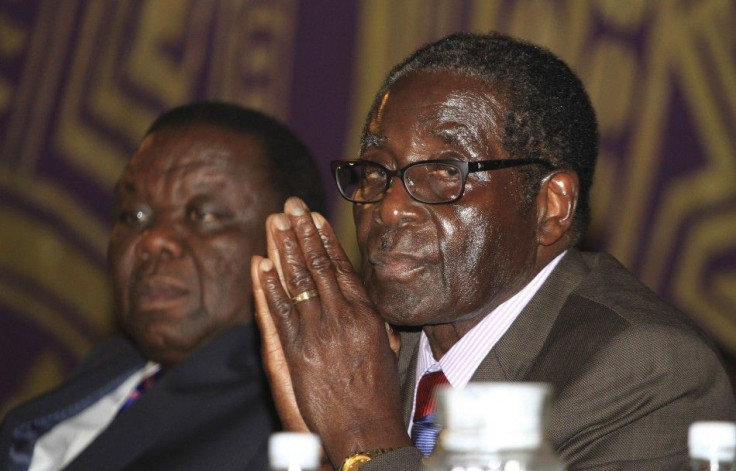Robert Mugabe: Illness Of Zimbabwe President Debated In Prophesies, WikiLeaks, Rumors

Zimbabwe President Robert Mugabe has yet to return from a trip to Singapore, and rumors that he is hospitalized and in critical condition are quickly intensifying.
Mugabe left Zimbabwe for Asia on March 30, and Voice of America reports that government processes have stagnated in his absence. A Tuesday cabinet meeting, which should have been chaired by the president, has been postponed. Meanwhile, an attempt by Prime Minister Morgan Tsvangirai to hold a Council of Ministers meeting was boycotted by officials loyal to Mugabe.
On Tuesday, two high-ranking members of Mugabe's political party, the Zimbabwe African National Union-Patriotic Front (ZANU-PF), denied allegations that the president was fighting for his life, according to Reuters. The president is well and away on a private holiday to help his daughter prepare for post-graduate studies, but we are expecting him home this week, they said.
We are not going to be engaged over rumors, speculation and wishful thinking.
Conflicting Reports
The rumors are hard to ignore. They come from all sides; prophets, opponents, insiders and ordinary Zimbabweans have all been whispering about the death of a dictator.
Last year, cables released by WikiLeaks pulled back the curtain on talks between ZANU-PF politicians and the United States. As far back as 2006, it is alleged, Mugabe's wife told Zimbabwe Reserve Bank Governor Gideon Gono that the president was out of it about 75 percent of the time, a message that was relayed to U.S. officials. The papers also evinced a struggle for succession rights between members of Mugabe's elite inner circle, according to the Christian Science Monitor.
More recently, self-proclaimed clairvoyants have weighed in on the matter. The well-known Nigerian evangelist prophet Temitope Balogun Joshua -- widely known as TB Joshua -- gave a prophesizing sermon on his popular television show.
I'm seeing the head of state, and by that I mean a president, he said, according to the Zimbabwe Mail. He is not feeling well. He is very old. What am I seeing now? It's a sudden death. I'm seeing the death of an old African president in two months.
Many conjectured that the prophet might be referring to the ailing Mugabe, but Joshua later claimed he was talking about Malawi's president Bingu wa Mutharika, who died suddenly of a heart attack on April 6.
Still, some Zimbabweans held out hope that Mugabe might be next. One resident who reportedly lost his father to a political crackdown in 1983 told the Zimbabwe Mail that wishing death on someone is unholy. But Mugabe's death would be a blessing to this country.
As of Tuesday, international media are still divided over the status of Mugabe's health.
The Zimbabwe Mail released an article on Sunday saying that the president was on his deathbed and battling for his life, followed by a conflicting report on Monday that he would soon return to Zimbabwe.
On Twitter, The Daily Mail's Ian Birrell reports that Zimbabwe sources confirm that Mugabe is 'very critical' & security services are on highest alert.
A user claiming to represent ZANU-PF fired back: Please be advised 4the last time that... Mugabe is shopping with his wife, God has blessed him-you agents will probably die before him.
The Telegraph has reported that Mugabe plans to hand power to Defense Minister Emmerson Mnangagwa. Like Mugabe, Mnangagwa is feared by many Zimbabweans. He is seen as a ruthless, corrupt and brutal politician. In a clear sign that he is favored by the president, Mnangagwa served as a diplomatic envoy to Iran last month. He and Iranian President Mahmoud Ahmadinejad could be natural allies due to their shared enmity with Western powers. In addition, Zimbabwe's reserves of uranium could help to further Iranian nuclear initiatives.
A History of Corruption
Mugabe was first elected to lead the nation of Zimbabwe in 1980; he rode a wave of public support due to his leading role in the nation's impedance struggles during the 1960s and 70s. But since then, the president and party leader of the Zimbabwe African National Union-Patriotic Front (ZANU-PF) has watched his popularity decline.
Today his reputation is one of mismanagement, ruthlessness and corruption. Zimbabwe has made little developmental progress since its independence; poverty and hunger are widespread throughout the landlocked country. UNICEF reported that [t]he overall situation in Zimbabwe remains fragile due to the complex and severe crises experienced over the last five years... Food insecurity and disrupted livelihoods contribute to the overall fragile socio-economic situation.
During a 2008 presidential election, when early polls revealed that Mugabe was trailing candidate Morgan Tsvangirai of the opposing Movement for Democratic Change (MDC) party, the incumbent further damaged his own reputation by waging a campaign of vote-rigging, violence and intimidation. Mnangagwa played a leading role in implementing these brutal tactics. The violence eventually forced Tsvangirai to drop out, and Mugabe claimed victory. But a subsequent ruling from the Southern African Development Community resulted in a power-sharing arrangement; Mugabe now acts as president and Tsvangirai as prime minister.
This coalition government has proven unstable. Tsvangarai and many MDC members in Parliament have reported being harassed, persecuted and even arrested by forces loyal to ZANU-PF.
As a new election season nears, opposition leaders hope for a fair fight. But Mugabe has voiced intentions to secure another term, and Mnangagwa's prominence stokes fears of a repeat of the 2008 brutalities he engineered.
Mnangagwa's succession was allegedly planned to take place after this upcoming election, on the condition of Mugabe's victory. But present rumors of severe illness cast doubt on Mugabe's ability to run for the presidency one last time.
© Copyright IBTimes 2025. All rights reserved.






















